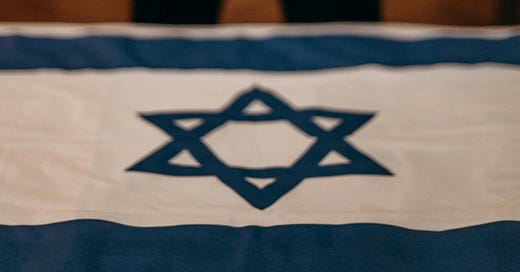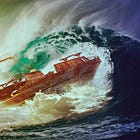The Lessons War Taught—And We Forgot
A new book revives the lessons our families, schools, and nation need most.
Hello Bar-setters,
Today, we treat 18-year-olds as if they are still fairly incapable kids. But that wasn’t an option for previous generations.
1917-1918 (years of U.S. involvement): World War 1
1941-1945(years of U.S. involvement): World War II
1950-1953 - Korean War
1955-1973 (years of U.S. involvement) - Vietnam
In these times, everyone understood: there was a deadline to dependency. By 18, young men had to be ready to shoulder real responsibility.
Highlighting What Matters Most
Our distance from war has consequences. It’s weakened the developmental arc of our youth. It’s softened the standards of citizenship. And it’s cut our purpose-starved society off from a recognition of what truly matters.
Like most of you, I’ve never served in war. And I hope my children never do.
We shouldn’t glorify war or forget its brutal cost. But we should also be wary of forgetting its vital historic function—how it tends to forge essential virtues, like courage, grit, sacrifice, and a clear sense of what matters, in those affected by it.
A proper study of history can immunize us from romanticizing war, while also reminding us why its lessons still matter.
Douglas Murray’s new book (out today), captures this beautifully. In it, he shares a story from a 50-year-old man named Avida Bachar, whom he met in a recovery unit in Ramat Gan, Israel:
He told me about watching his wife and son die in front of him in their safe room, in Be’eri, on October 7. But even through his tears, he still wanted to draw some light from it. He had had 32 years with his wife, he said, and he had had the good fortune to have 15 years with his son. And this was what mattered.
“All of us,” he said. “All of us, we think that the time is going on until the end. But the time, it’s really short. And I told my friends at work, there’s no meeting after four o’clock in the afternoon. We’re not going to stay at work. We go home to our friends and family to make a good time, and good memories. What we have, it’s only people.”
Stories like this shock us out of our malaise and remind us what truly matters.
A Moral Equivalent of War
Over a century ago, William James, the father of modern psychology, foresaw our current condition. In his 1906 essay The Moral Equivalent of War, he wrote:
Militarism is the great preserver of our ideals of hardihood, and human life with no use for hardihood would be contemptible… there is a type of military character which every one feels that the race should never cease to breed, for everyone is sensitive to its superiority. The duty is incumbent on mankind, of keeping military character in stock…
James was an ardent pacifist who hoped for an end to all wars.
But he understood a deeper truth: without real struggle, we decay.
History, of course, did not heed James’ pacifist hopes.
It is easy to be lulled into a false sense of security, but history shows that chaos is inevitable in the span of any life, particularly for those who forget the lessons of history.
To be clear, I hope you and yours enjoy as much peace and happiness as possible.
But we must still wrestle with the question:
What would we die for? And what are we doing to raise young people who know their answer to that question?
Had we kept these lessons at the top of mind, our failed youth development paradigm would never have taken hold, in the first place.
Below are two powerful pieces that help highlight some of these essential lessons. Both are great examples of the sort of vital education I wrote about last week.
The Book
Douglas Murray’s new book is out today. Read this amazing excerpt.
The Article from January 1944
In January 1944, most Americans didn’t believe the Holocaust was real.
In a stunning piece, New York Times journalist Arthur Koestler describes the challenge of waking people up to atrocities:
“I have photographs before me… People died to smuggle them out of Poland; they thought it was worth while…
…I’ve been lecturing to the troops… they don’t believe in concentration camps, or starved children in Greece, or mass graves in Poland… You can convince them for an hour, then they shake themselves. In a week, the shrug of incredulity returns like a reflex.”
In Conclusion…
We need rites of passage.
We need a “moral equivalent of war.”
We need to produce young adults who are strong in body, capable in mind, and grounded in purpose.
Because while war is not necessarily inevitable, responsibility still is. And when we fail to set a deadline for dependency, it’s our children who pay the price.
Thank you for reading and sharing
Shane








